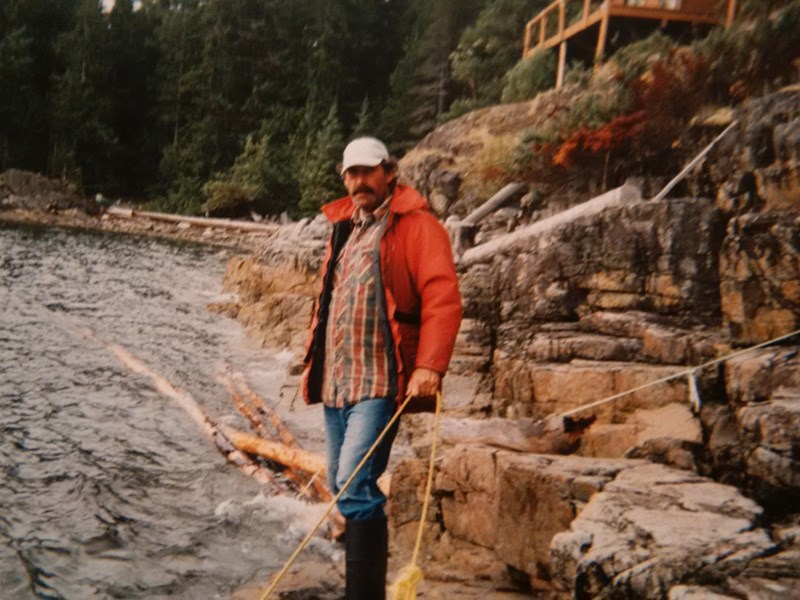Previous chapter [“The fender bender,” November 23]: When I was in my late 20s (around 1999), I showed up at the Okeover Government Wharf north of Powell River for the first time in over 10 years to visit my family cabin with a bunch of my very eager friends, and without my parents. Before we shoved off from the wharf, my pal Rory ran back up to the foot of Malaspina Road to park his car, which he had left in a loading zone of sorts. As Rory hopped in, a big white pickup truck backed into his car. Rory was incensed, and found himself facing off with a giant of a man with deep-set dark eyes and a black, curled moustache as thick and wide as scrub brush, and he wasn’t happy.
“What the hell was that you idiot?” Rory yelled.
Rory was a pretty tall guy but Bernard the German towered over him. I crouched down a little and watched the unfolding confrontation from our little aluminum boat, still tied to the dock and loaded to the gunwales with canned beer and friends in preparation for the long weekend.
Bernard the German stared long and hard at Rory and took a slow breath.
“Sorry about that there bud, but take a look at that,” huffed Bernard. His voice was a curious mix of German accent and Canadian hoser. Bernard slowly pointed one of his thick, Bavarian, sausage-like index fingers to a sign directly above Rory’s car: “No parking – This means U.”
“I guess that means you, eh?” Bernard chortled. “Bit of a tight turnaround down here.”
I could see Rory’s anger rising in the shadow of the giant.
I had forgotten to warn my friends about an end-of-the road phenomenon commonly referred to as “island time.”
Island time is something that can exist in any backwater, and is not really restricted to actual, you know, islands. Island time is a way of life, an end-of-the-road philosophy, a pace, a rhythm. If you’re on island time, everything moves a whole lot slower than it does in the city from whence you came.
Almost in easygoing defiance of the rat race, nothing is ever that big of a deal at the end of the road, including a fender bender. And anger gets you absolutely nowhere in these types of places, Desolation Sound included.
Any open display of frustration or lack of patience towards a local marks you as a city slicker right away, and can freeze you out of the local community. Rory was not yet on island time.
Unfazed by the sheer size of the German, Rory spat back, “No parking means you can ram into my car? You’re lucky it isn’t worth fixing. Watch where you’re going next time you old fart.”
Bernard’s eyes narrowed under the brim of his Edmonton Oilers baseball cap. His fingers twitched like a gunfighter.
“Watch it there, bud. You don’t want to bring out the German in me.”
None of us had any idea what that meant, but we didn’t want to find out. Bernard slowly pivoted his head and glared at the rest of us stuffed in our skiff.
“Isn’t that the Lawrence’s boat you’re in?”
Great. So now Bernard the German knew who we were, and my dad, who insisted that I be respectful to our neighbours, was sure to find out about it.
Hours later, we had made it safely to the cabin and were lounging around on the deck, having forgotten all about Bernard the German. That was when one of my friends noticed a small aluminum speedboat slowly approaching. We could see a hulking man at the wheel. I grabbed the binoculars.
“Oh no. It’s him. It’s Bernard the German, and he’s headed right for us.”
Rory jumped up. “Are you kidding me, what the hell does he want?” asked Rory, who admitted earlier that he was glad to have left the wharf in one piece. “Should we hide?” another friend suggested.
Bernard cut his engine directly in front of our cabin and let his boat drift. He rose to his full height. He heaved up a metal barrel with a rope attached to it.
“No hard feelins about the incident at the dock, eh?” he said.
And with that, he threw the barrel into the ocean with a heavy splash. It sank, the rope spiralling out after it. Bernard hung on to the other end and tied a small buoy to it. He threw that up onto the rocks below our cabin. Then Bernard the German fired up his boat and left, without another word, gesture, or glance back. We were dumbfounded; we had no idea what it could be.
Once the German’s boat was out of sight, we scrambled down onto the rocks and hauled on the rope. To our great delight, the treasure we discovered was a weighted keg of Bavarian pilsner beer. Bernard was using the 20 feet of ocean depth to keep the keg cold.
That night we had a heck of a cabin party in the wilderness, complemented by frothing, icy cold Bavarian beer. And we were sure to raise a toast to the mysterious Bernard the German. Maybe he wasn’t as frightening as his exterior would lead you to believe? But who was he? To fully understand who this man really was, you’ll have to go back to the beginning, to the war-torn aftermath of a destroyed and starving city in post-war Germany. That’s in the next chapter of Bernard the German.
Grant Lawrence is an award-winning author and a CBC personality who considers Powell River and Desolation Sound his second home. "Bernard the German" is currently also airing as a weekly radio serial on North by Northwest, CBC Radio One in BC. Anyone with stories or photos they would like to share of Bernard "The German" Krieger, can send an email to [email protected].



